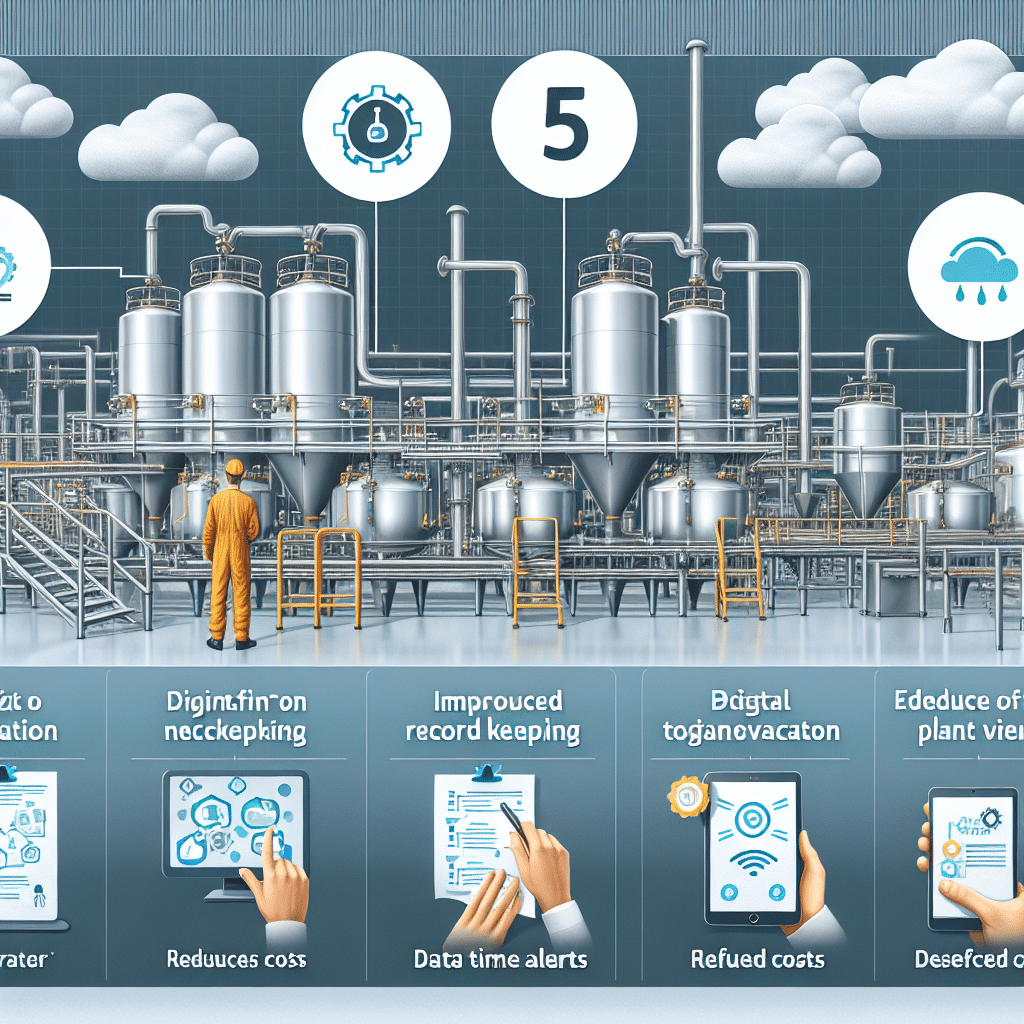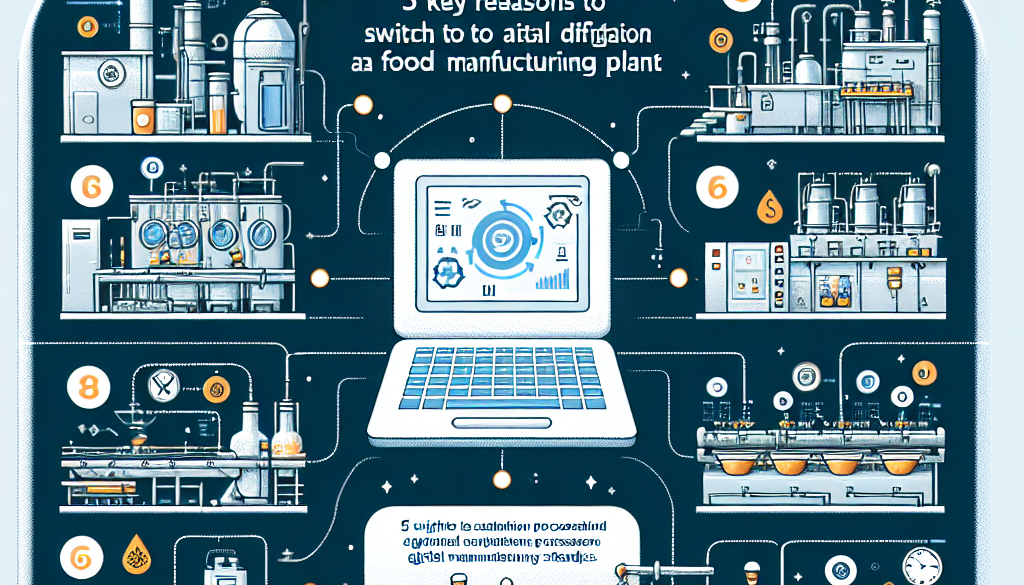Five Reasons to Digitize Your Food Plant Sanitation Process
-
Table of Contents
- Digitize Your Food Plant Sanitation: Top Five Reasons to Embrace Technology
- 1. Enhanced Traceability and Accountability
- 2. Increased Efficiency and Productivity
- 3. Real-Time Monitoring and Alerts
- 4. Improved Compliance with Regulations
- 5. Cost Savings and Return on Investment
- Conclusion
- Enhance Your Food Plant’s Operations with ETprotein’s High-Quality Protein Products
Digitize Your Food Plant Sanitation: Top Five Reasons to Embrace Technology

The food industry is one of the most critical sectors when it comes to maintaining high standards of hygiene and sanitation. With the advent of digital technologies, food plant sanitation processes are undergoing a significant transformation. Digitization offers numerous advantages that can enhance efficiency, compliance, and safety in food production facilities. Here are five compelling reasons why food plants should consider digitizing their sanitation processes.
1. Enhanced Traceability and Accountability
Digitizing sanitation processes allows for better traceability and accountability within food plants. With digital records, it’s easier to track who performed sanitation tasks, when they were completed, and whether they met the required standards. This level of detail is crucial for:
- Complying with food safety regulations such as the Food Safety Modernization Act (FSMA).
- Providing evidence during audits and inspections.
- Quickly identifying and addressing any issues that may arise.
Statistics show that digitized traceability systems can reduce the time needed to trace a product from days to seconds, which is vital during a food safety recall.
2. Increased Efficiency and Productivity
Digitization can streamline sanitation processes, leading to increased efficiency and productivity. Automated systems can schedule cleaning tasks, monitor completion, and even guide employees through the sanitation process. This reduces the likelihood of human error and ensures that no steps are missed. Benefits include:
- Reduced downtime due to more efficient cleaning processes.
- Optimized use of resources, including labor and cleaning agents.
- Improved overall plant productivity due to a well-maintained facility.
Studies have found that digital tools can improve productivity by up to 20% by simplifying and speeding up routine tasks.
3. Real-Time Monitoring and Alerts
Real-time monitoring is another significant advantage of digitizing your food plant’s sanitation process. Sensors and IoT (Internet of Things) devices can provide instant data on cleanliness levels, temperature, humidity, and other critical factors that affect food safety. This technology enables:
- Immediate corrective actions if parameters deviate from set standards.
- Continuous improvement of sanitation processes based on real-time data.
- Preventative maintenance to avoid equipment failures that can compromise sanitation.
According to recent reports, IoT in the food industry is expected to grow at a CAGR of 9.5% from 2020 to 2025, highlighting the increasing reliance on real-time data.
4. Improved Compliance with Regulations
Food safety regulations are becoming increasingly stringent, and non-compliance can lead to severe penalties. Digitization helps ensure that sanitation processes meet or exceed regulatory requirements by:
- Automatically updating procedures to comply with the latest standards.
- Generating detailed reports for regulatory bodies with minimal effort.
- Reducing the risk of human error in record-keeping and process execution.
With digital systems, compliance rates can improve significantly, as evidenced by a reduction in food safety incidents reported by companies that have adopted such technologies.
5. Cost Savings and Return on Investment
While the initial investment in digital sanitation systems may be significant, the long-term cost savings and ROI are compelling. Digitization can lead to:
- Lower labor costs due to increased efficiency.
- Reduced waste of cleaning agents through precise dosing and monitoring.
- Decreased risk of costly recalls or shutdowns due to contamination.
Industry analysis indicates that for every dollar spent on food safety technologies, companies can expect a return of $10 in reduced costs and increased productivity.
Conclusion
Digitizing your food plant’s sanitation process is not just a trend; it’s a strategic move that can lead to significant improvements in traceability, efficiency, compliance, and cost savings. By embracing digital technologies, food plants can ensure they remain competitive and continue to meet the high standards expected by consumers and regulatory bodies. The five reasons outlined above provide a strong case for why digitization should be a priority for any food production facility looking to enhance its sanitation processes.
Enhance Your Food Plant’s Operations with ETprotein’s High-Quality Protein Products
As you digitize your food plant’s sanitation process, consider partnering with ETprotein for your protein ingredient needs. ETprotein offers a wide range of high-quality, organic bulk vegan proteins that can complement your food products. Their offerings are characterized by a neutral taste, non-GMO, allergen-free attributes, and high purity levels, making them an excellent choice for food manufacturers who prioritize quality and safety.
About ETprotein:
ETprotein, a reputable protein and L-(+)-Ergothioneine (EGT) Chinese factory manufacturer and supplier, is renowned for producing, stocking, exporting, and delivering the highest quality organic bulk vegan proteins and L-(+)-Ergothioneine. They include Organic rice protein, clear rice protein, pea protein, clear pea protein, watermelon seed protein, pumpkin seed protein, sunflower seed protein, mung bean protein, peanut protein, and L-(+)-Ergothioneine EGT Pharmaceutical grade, L-(+)-Ergothioneine EGT food grade, L-(+)-Ergothioneine EGT cosmetic grade, L-(+)-Ergothioneine EGT reference grade and L-(+)-Ergothioneine EGT standard. Their offerings, characterized by a neutral taste, non-GMO, allergen-free attributes, with L-(+)-Ergothioneine purity over 98%, 99%, cater to a diverse range of industries. They serve nutraceutical, pharmaceutical, cosmeceutical, veterinary, as well as food and beverage finished product distributors, traders, and manufacturers across Europe, USA, Canada, Australia, Thailand, Japan, Korea, Brazil, and Chile, among others.
ETprotein specialization includes exporting and delivering tailor-made protein powder and finished nutritional supplements. Their extensive product range covers sectors like Food and Beverage, Sports Nutrition, Weight Management, Dietary Supplements, Health and Wellness Products, and Infant Formula, ensuring comprehensive solutions to meet all your protein needs.
As a trusted company by leading global food and beverage brands and Fortune 500 companies, ETprotein reinforces China’s reputation in the global arena. For more information or to sample their products, please contact them and email sales(at)ETprotein.com today.












